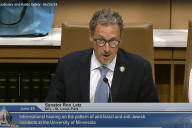You have /5 articles left.
Sign up for a free account or log in.
Despite being at the center of multiple controversies this year, Rutgers University President Robert Barchi received a $90,000 bonus from the university’s Board of Governors.
The bonus -- which comes on top of his $650,000 salary, and perks like a house and car and driver -- will be donated back to the university, Barchi said.
But the bonus came despite athletics scandals, questions about the president’s corporate ties and several other controversies -- including a poorly received joke about race, as well as charges that he ignores two of Rutgers’s three campuses – that have weakened Barchi’s support among faculty members.
The board was obviously focused on other things.
“We are delighted with the progress Rutgers has seen this past year and we thank you for your dedication and leadership,” board Chairman Gerald Harvey wrote the president on Oct. 7. “We look forward to continued success in the future.”
Two days later, Barchi said he would give back the money. "Given that we are currently in a year of fiscal restraint and that we are asking our faculty, students, and staff to do more with less, Francis and I intend to gift the net proceeds of this incentive compensation to Rutgers," he wrote on Oct. 9.
Barchi’s employment agreement allows him to receive an annual bonus of up to $97,500 if he can meet “specific goals and objectives,” which the April 2012 agreement does not enumerate. Documents released by the university don’t make clear just what the board was looking for from Barchi, but a spokesman, Greg Trevor, elaborated a bit.
“While those goals and expectations are clearly a personnel matter,” Trevor said in an e-mail, “it is fair to assume that successfully managing the nation’s largest integration of health sciences education into an existing research university, overseeing the entrance of Rutgers into the Big 10 and the Committee on Institutional Cooperation, undertaking the first strategic planning initiative in more than a decade and having a banner fund-raising year all may have played into the board’s decision.”
Adrienne Eaton, the past president of the American Association of University Professors chapter at Rutgers, wondered if Barchi deserved a bonus for the state-mandated merger with the University of Medicine and Dentistry of New Jersey, which may have been part of the reason Rutgers went with Barchi, a neurosurgeon, rather than a more traditional choice, she said.
“O.K., fine, it happened, the medical school,” Eaton said. “There were no major disasters -- is that really the standard we are looking for?”
Other than that, faculty reaction appears generally muted.
Professors are simply too fed up to care, said Lisa Klein, the current AAUP president and a professor of materials science and engineering. She blamed not only campus politics but New Jersey politics and Washington politics, which, of course, have shut down the government and hindered scientific research nationwide.
“I just think everybody is so demoralized that whether the president got his bonus or not -- they don’t really care,” Klein said.
Barchi’s contract, which allowed him to receive a bonus during a year that may be hard to characterize as Rutgers’s best -- the athletic scandals alone made national headlines -- is a function of how many executive contracts are structured and boards operate.
The largest controversy involved the former basketball coach Mike Rice, who kept his job even after administrators saw and discussed a video of him assaulting players.
Though subordinates had earlier brought the controversy to his attention, Barchi didn’t watch the video -- a 30-minute segment of Rice shouting homophobic and sexist slurs at players, shoving and kicking and throwing basketballs at them -- until the day it aired on ESPN.
Tyrone Thomas, a lawyer who specializes in executive compensation, said Barchi’s contract was “consistent with good practices,” particularly the self-evaluation that Barchi is to do each year for the board.
“Keep in mind, the bonus has a couple of different purposes,” he said.
He said the No. 1 goal of boards is to make sure university leaders see progress on strategic goals, like academics, fund-raising and endowments.








